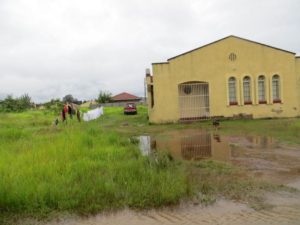
A house built in the midst of a wetland
Senior officials from the Ministry as well as a representative from the Zimbabwe Lawyers for Human Rights (ZLHR) also attended the meeting.
Below are the HWT’s submissions during the meeting with the Minister of Environment;
There is a need to strengthen and reform legislation with regards to the protection of wetlands. HWT cited the Environmental Management Act which allows for development on wetlands in the event that an Environmental Impact Assessment certificate is issued by the Environmental Management Agency.
There is an imperative need for the gazetting of the Harare Wetlands Map and the City of Harare should come up with a Master Plan as well as Local Environmental Action Plan on the protection of wetlands
The government of Zimbabwe ought to take a leaf from countries such as Kenya and Uganda that have implemented the Ramsar Convention recommendations on the restoration of wetlands. There is a need to restore Harare wetlands as nature reserves
HWT is working in partnership with the Environmental Management Agency to ensure that the Harare Wetlands Map is updated
In line with the Environmental Management Act (Section 113) wetlands must be declared as ecologically sensitive areas.
Of late the Environmental Management Agency has been issuing a lot of Environmental Impact Assessment certificates that have paved the way for construction on wetlands yet almost all the open spaces left in Harare are wetland areas.
Due to continued wetlands destruction in Harare, siltation of the capital’s main water source, Lake Chivero has rapidly increased. Wetlands destruction has also come with huge costs on water purification. Preserving wetlands will allow them to play their natural function of water purification hence reducing costs associated with the purification of water
Harare must be declared a wetland city and this should be done bearing in mind the fact that wetlands are important water sources for Harare
There is a serious violation of the law that is leading to the destruction of wetlands in Harare. Some companies are proceeding with construction projects in the absence of Environmental Impact Assessment Certificates and Development Permits
The City of Harare must be compelled to consult with stakeholders before proceeding to issue development permits. There is also a need to create a One-Stop-Shop for the issuance of Environmental Impact Assessment certificates to allow for input or objections from concerned stakeholders
IN RESPONSE to the submissions by HWT, the Minister of Environment, Honorable Nqobizitha Ndlovu said that in light of the dire water situation in Harare, construction on wetlands ‘is something that certainly cannot be allowed to continue’.
“I do not think it is sustainable to continue building on wetlands. The President has also been very clear on the need to protect our wetlands and we also need to enforce the legislation that we have to make sure we protect our wetlands. We will make our best efforts to bring critical stakeholders to the table so that we come up with an agreed position on wetlands protection,” said Minister Ndlovu.
It was proposed at the meeting that there is a need for engagement between stakeholders that include Ministries such as Local Government, Housing, Environment, Justice as well as government departments, the City of Harare and Environmental Groups to map the best way forward with regards to wetlands protection.
Minister. Ndlovu assured the HWT delegation tat this will be achieved in the first quarter of 2020.
He highlighted that legislative reform requires input from different stakeholders hence the need for an all stakeholders approach to the issue.
Post published in: Featured

